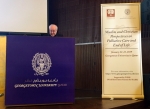Palliative Care and End-of-Life: in dialogue with Muslim world

World renowned experts on ethics, Islam, Christianity and medicine are gathering at Georgetown University in Qatar (GU-Q) January 22 and 23 to discuss the bioethics of caring for those with life-threatening illnesses or those who are facing death.
The two-day conference, titled ‘Christian and Muslim Perspectives on Palliative Care and End of Life’, is jointly organised by GU-Q and the Vatican’s Pontifical Academy for Life.
The conference aims to initiate a multidisciplinary exchange on the issues surrounding the treatment of patients facing life threatening illness and death, with a particular focus on opportunities and barriers to care in Qatar and the region.
The conference opened at 8.30am with remarks by GU-Q dean Ahmad Dallal and Archbishop Vincenzo Paglia, president of the Pontifical Academy for Life.
Archbisho Paglia said: "Today the palliative care scientific community recognizes the important role that religions play in advancing this form of accompaniment of the sick or dying, given the ability of religions to reach the peripheries of humanity, those who in every community are in some way most in need. While this is certainly true, religions are and do much more. Religions are not only able to facilitate a greater presence of palliative care where it is needed, but they are one of the true component forces of palliative care itself. Total attention to the person is made much more difficult by economic hegemonies that colonize contemporary cultures and societies".
Then Archbishop Paglia noted: "The palliative care community bears witness to a new way of living that focuses on the person and his good, to which not only the individual but the whole community tends. In this community the good of each person is pursued as a good that benefits everyone. Palliative care is a human right, and various international programs are working to implement it; but the basic human right is to continue to be recognized and accepted as a member of society, as part of a community".
The Conference opened with the signing of a Joint Declaration on the End of Life and Palliative Care, issued by WISH and the Pontifical Academy for Life, two institutions of different faiths, but sharing the task of study, scientific advancement and cultural development; two academic institutions that specifically in palliative care find a fruitful ground for encounter and cooperation in order to reach a new humanism for the benefit of all persons and all peoples.
And finally Archbishop Paglia said: "I hope that these two days can make an effective contribution to making palliative care—which is called on every day to face great challenges in accompanying the dying—more well-known and fully accepted by public opinion, and can give rise to a fruitful new humanism for the benefit of all. I am sure that we can work together effectively and learn much from each other".
Doha, Qatar, January 22 2019












